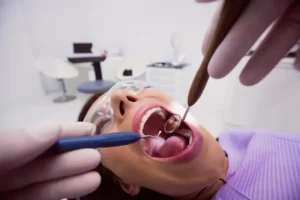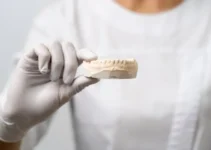Understanding the right gingivitis treatment is essential for maintaining oral health and preventing the progression of gum disease. Gingivitis, which is the early stage of gum disease, is primarily caused by plaque buildup along and under the gum line. If left untreated, it can lead to more severe oral health issues. Treatment options range from professional dental cleaning to practicing stringent oral hygiene routines at home. This article explores various treatments and effective natural remedies that can help manage and reverse the symptoms of gingivitis, ensuring your gums remain healthy and strong.
What is Gingivitis?
Gingivitis is an inflammatory condition of the gums that is often a precursor to more severe periodontal diseases. This condition is caused by the accumulation of bacteria and plaque on the teeth, which leads to the inflammation of the gum tissues surrounding the teeth. While gingivitis is typically mild and reversible, if left untreated, it can progress to periodontitis, a serious infection that can result in tooth loss.
According to various studies, nearly half of all adults experience some form of gingivitis in their lifetime. Effective treatment and management of gingivitis primarily involve improved oral hygiene practices, including regular brushing, flossing, and professional dental cleanings. Early identification and intervention are crucial for preventing the progression of gingivitis to more severe periodontal issues.
Signs and Symptoms of Gingivitis
The most common signs and symptoms of gingivitis include red, swollen gums that may bleed easily when brushing or flossing. Many people with gingivitis may not experience pain, which can lead to a false sense of security about the health of their gums. It is essential to recognize these early warning signs to take appropriate action.
Other symptoms may include bad breath (halitosis), receding gums, and a change in the color of the gums from a healthy pink to a more reddish hue. In some cases, individuals may notice a soft, spongy texture to their gums. If these symptoms are observed, it is critical to seek professional dental advice.
Common Causes of Gingivitis
Gingivitis is primarily caused by the accumulation of plaque, a sticky film composed of bacteria that forms on the teeth and gums. When plaque is not removed through regular brushing and flossing, it hardens into tartar, which cannot be removed by regular home care methods and requires professional cleaning.
Several factors contribute to the development of gingivitis, including:
- Poor oral hygiene habits
- Smoking or chewing tobacco
- Chronic diseases such as diabetes
- Certain medications that affect gum health
- Hormonal changes, such as those occurring during pregnancy
Understanding these common causes and risk factors can help individuals and dental professionals develop targeted preventive measures. By being proactive in maintaining oral health, it is possible to significantly reduce the risk of gingivitis and its associated complications.
Professional Treatments for Gingivitis
Gingivitis is an early stage of gum disease characterized by inflammation, redness, and swelling of the gums. Left untreated, it can progress to more severe forms of periodontal disease. Fortunately, there are several professional treatments available to address gingivitis effectively. In this section, we will explore two of the most common and effective treatments: Deep Cleaning and Scaling and Antibiotic Treatments.
Each of these treatments plays a critical role in managing and mitigating the effects of gingivitis. Professional intervention is vital in preventing the progression of this condition, and understanding these treatments can help patients make informed decisions about their oral health.
Let’s delve into these treatments in more detail to understand how they work and their benefits.
Deep Cleaning and Scaling
Deep cleaning and scaling, also known as root planing and scaling, is a non-surgical procedure aimed at removing plaque and tartar (calculus) from below the gum line. This procedure helps to eliminate the bacteria that cause gingivitis and promotes the reattachment of gums to the teeth.
Deep cleaning involves two main steps:
- Scaling: This step involves removing plaque and tartar from the tooth surfaces and beneath the gum line using specialized dental instruments.
- Root Planing: This step smooths out the tooth roots to help the gums reattach to the teeth. It also reduces the risk of future plaque and tartar buildup.
This procedure is typically performed by a dental hygienist or a periodontist and may require local anesthesia to ensure patient comfort. Studies have shown that deep cleaning and scaling can significantly reduce gum inflammation and bleeding, making it a highly effective treatment for gingivitis.
Antibiotic Treatments
In some cases, dentists may recommend antibiotic treatments in conjunction with deep cleaning and scaling to control bacterial infection in the gums. Antibiotics can be administered in various forms, including:
- Topical Antibiotics: These are applied directly to the gums in the form of gels, mouth rinses, or fibers placed in the gum pockets.
- Oral Antibiotics: These are taken in pill form and work systemically to reduce bacterial infection throughout the body.
- Antibiotic Microspheres: Tiny spheres filled with antibiotics are inserted into the gum pockets to release medication over time.
The use of antibiotics can help reduce bacterial load and inflammation, promoting healthier gums and preventing the progression of gingivitis. However, antibiotics are generally recommended as an adjunct to mechanical cleaning rather than a standalone treatment.
It’s important to note that while antibiotics can be highly effective, their use should be carefully monitored to avoid the development of antibiotic resistance. Regular follow-up appointments with your dentist are crucial to assess the effectiveness of the treatment and make any necessary adjustments.
For those interested in maintaining optimal oral health, understanding these professional treatments for gingivitis is just the beginning. We encourage you to explore our other articles for more insights on dental care and advanced treatments.
Effective Home Remedies for Gingivitis
Gingivitis is a common and mild form of gum disease that causes irritation, redness, and swelling of your gingiva, the part of your gum around the base of your teeth. It’s important to address gingivitis promptly as it can lead to more serious gum diseases. While professional dental care is essential, there are several home remedies that can be effective in managing and even reversing gingivitis. These remedies focus on reducing bacterial buildup, soothing inflammation, and promoting oral health. Incorporating some simple yet effective habits can make a significant difference in your oral hygiene routine. Let’s explore some of the most recommended home remedies for gingivitis.
Salt Water Rinse
A salt water rinse is one of the oldest and simplest ways to help reduce gum inflammation and kill bacteria in your mouth. Salt has natural disinfectant properties and can help alleviate the symptoms of gingivitis by reducing swelling and fighting infection.
To prepare a salt water rinse, dissolve half a teaspoon of salt in a glass of warm water. Swish the solution around in your mouth for 30 seconds, then spit it out. You can repeat this process two to three times a day, especially after meals, to keep your gums healthy and clean.
Regular use of a salt water rinse can lead to significant improvements in gum health. However, it’s important to note that overuse can potentially damage tooth enamel, so it should be used in moderation.
Hydrogen Peroxide Mouthwash
Hydrogen peroxide is a powerful antiseptic that can be used as a mouthwash to help treat gingivitis. It works by killing bacteria and promoting a healthy oral environment. It’s particularly effective in removing plaque and reducing gum inflammation. To create a hydrogen peroxide mouthwash, mix equal parts of hydrogen peroxide (3% solution) and water. Swish the mixture in your mouth for about a minute, then spit it out. Be sure not to swallow the solution. Using this mouthwash once or twice a week can significantly reduce gingivitis symptoms.
It’s important to use a diluted solution to avoid irritation and potential damage to your gums and teeth. Always follow the recommended guidelines for hydrogen peroxide use.
Natural Oils and Herbs
Certain natural oils and herbs have anti-inflammatory and antibacterial properties that can be beneficial in treating gingivitis. For instance, tea tree oil and coconut oil are popular choices for oil pulling, a practice that involves swishing oil in your mouth to remove toxins and bacteria.
To perform oil pulling, take a tablespoon of coconut oil and swish it in your mouth for about 15-20 minutes, then spit it out. This practice can help reduce plaque buildup and improve gum health. You can follow this routine daily for best results.
Herbs like sage and aloe vera have also shown promise in treating gingivitis. Sage mouthwash or aloe vera gel can be applied to the gums to soothe inflammation and fight infection. Incorporating these natural remedies into your oral care routine can offer additional benefits for your gum health.
While these home remedies can be effective, it’s crucial to maintain regular dental check-ups and practice good oral hygiene habits to ensure optimal gum health. For more detailed information on maintaining healthy gums and other dental topics, be sure to explore our other articles.
Common Questions About Gingivitis Treatment
If you’re struggling with gingivitis, you may have several questions about how to effectively manage and treat this gum disease. Below, find answers to some of the most commonly asked questions to help you better understand your treatment options and what you can do at home.
What are the first steps in treating gingivitis?
The first step in treating gingivitis involves improving your oral hygiene. This includes thorough brushing at least twice a day, flossing daily, and using an antibacterial mouthwash to reduce the levels of harmful bacteria in your mouth. Additionally, it’s important to schedule a professional cleaning with your dentist, who can remove any tartar and plaque buildup, crucial in controlling gingivitis.
Can home remedies be effective in treating gingivitis?
Home remedies can complement medical treatments and help manage symptoms of gingivitis. Some effective home remedies include rinsing your mouth with a saltwater solution to reduce inflammation, using a turmeric gel for its antibacterial properties, and applying aloe vera to soothe irritated gums. However, these should be used in conjunction with professional dental treatment and not as replacements.

My name is Salman Kapa, a 73-year-old expert in bone regeneration and dental implantology. With decades of experience in the field, I am dedicated to advancing our understanding of oral health and hygiene. Through my research and writing, I aim to contribute to the development of innovative solutions in dental care.




